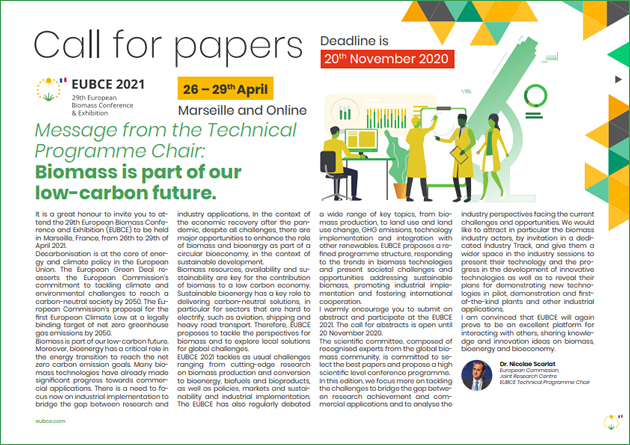 |
| |
Bioenergy has an important role in the transition away from fossil fuels and to move the global energy system
towards carbon neutrality

Ir. Luc Pelkmans
Technical Coordinator - IEA Bioenergy TCP
Different types of bioenergy are available now and can be integrated in existing infrastructure; biobased fuels and intermediates are storable, applicable in different sectors (transport, heat, electricity) and there is flexibility to redirect biomass/bioenergy to sectors that are difficult to electrify, such as long haul transport or high temperature heat in industry; and it can provide net carbon removal from the atmosphere when combined with carbon capture and storage.
Yet, there is a heated debate on bioenergy in several countries and its role in the energy transition is often underestimated. The key to address potential risks of bioenergy deployment is not to block bioenergy developments, but to find ways to mitigate these risks. From IEA Bioenergy side we consider it very important to collaborate at international level to provide scientific evidence, collect experiences and good practises, and to raise awareness on what sustainable bioenergy means, to point to the various types of biomass/bioenergy, how it can be deployed and scaled up in a sustainable way, and how it connects to the overall bioeconomy.
We believe the EUBCE provides an excellent annual occasion to meet and exchange ideas and take steps forward in sustainable bioenergy.
Bioeconomy challenges and opportunities in Africa
through the lens of COVID-19

Maria Michela Morese, PhD
Natural Resources Officer
Executive Secretary of the Global Bioenergy Partnership (GBEP)
Office of Climate Change, Biodiversity and Environment
Food and Agriculture Organization of the United Nations
The COVID-19 pandemic has brought Africa to urgently address its energy access deficit. Without secure, reliable and quality access to power, the region’s health systems and related infrastructure cannot function, especially during a pandemic situation. Nonetheless, energy demand in Africa continues to grow and this presents challenges in mobilising the substantive and transformative investments needed, but it also offers opportunities for Africa to correct its vast energy deficit with green transformative business models. African countries have the opportunity to build back better with resilient energy systems that not only address energy access and climate change, but also spur economic growth and employment.
In this general context, the demand for agricultural and forestry products is rapidly increasing in Africa, due to growing demand for food, feed, fuel, fibre and biochemicals. As demand increases, so too do the pressures on this natural resource base and ecosystem services due to overexploitation and pollution.
Bioeconomy, in particular in Africa, may represent an opportunity to tackle many societal issues concurrently. This is especially important also in the context of climate change: the circular bioeconomy is viewed as one of the solutions for low carbon development, but climate change is concurrently increasing the pressures on natural resources and ecosystem services, possibly restricting the potential role of biomass as a solution. As with any system with a multitude of linkages, there are inevitably synergies and trade-offs between the components, and sustainability of biomass should be cross-sectoral to be able to effectively take into account cumulative impacts of multiple sectors, whilst also taking advantage of potential synergistic biomass uses across these sectors.
The EUBCE is the place where these matters are discussed by experts, academia and companies, and where innovative ideas and industrial initiatives are presented, also with a view to facilitate cooperation with regions outside the EU, including with Africa.
Become part of the Conference Programme – submit your abstract by 20 November 2021

Be part of this international biomass & bioeconomy conference and present your latest results to specialists and decision-makers from around the globe.

The deadline is 20 November 2020
   
www.eubce.com
|
|
|
| |
COORDINATION OF THE TECHNICAL PROGRAMME
|
|
|
|
|
|
|
|
|
| |
INSTITUTIONAL BIOMASS INDUSTRY COOPERATION
|
|
|
|
|
|
|
|
|
|
|
|
|
|
|
|
|
|
|
|
|
|
|
|
|
|
|
|
|
|
|
|

